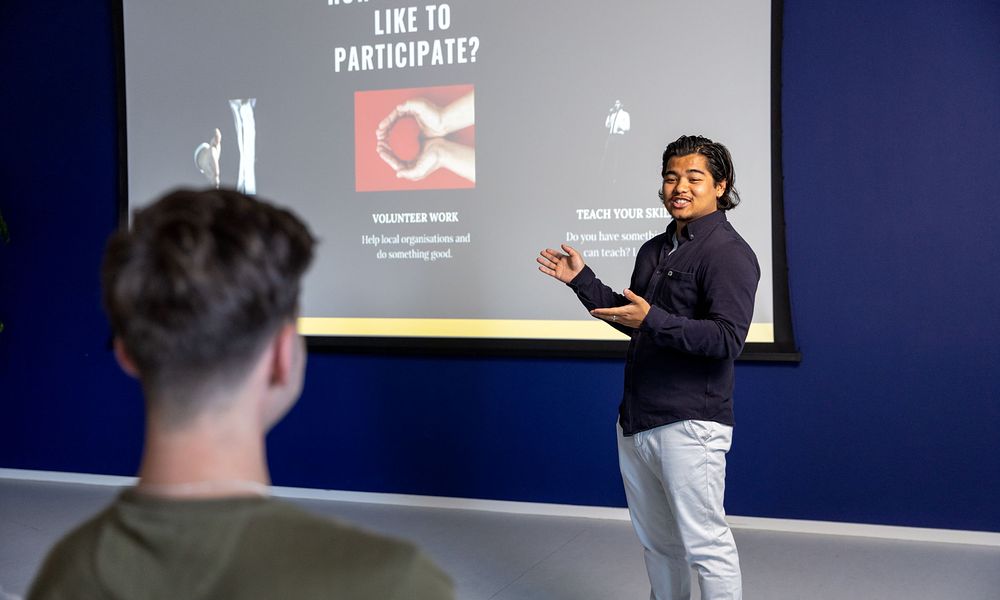Organizational Culture and Change Communication

Organisations and Change Communication
- Level
- Language
- English
- Credits
- 30 ECTS
- Startmonths
- Start: February
- Locations
- Groningen
During this programme you will write a report on a communication scan and compose advice for a client based on the outcome of the analysis. You will come up with concrete suggestions about how communication can contribute to the organizational change and formulate advice: think about a training, a workshop, building an online platform, develop new media, etc.
About this minor
You will establish a communication strategy for the organisation and make appropriate recommendations about the use of communication. Change communication contributes to the creation of value for an organisation in change and its external stakeholders. This includes well-founded means of communication to foster the organisational culture needed to embrace the change.
Project: Communication Scan
Credits
5
Content
Communication professionals can be called to facilitate organisational changes through internal and external communication. Internal communication and change communication are essential to foster an organisational culture that supports the desired organisational change. You will, in a team of students, investigate the ambitions of the project client. Together you will critically review the internal environment of the organization using relevant theoretical models as a foundation for their argument. You will also evaluate the communication with external stakeholders impacted by the desired organisational change as well as possible external factors that could impact the organisation. You will produce a report on the state of affairs of the organisation as the fundament for the communication advice that they will produce in the next block.
Communication and Organisations Theory
Credits
5
Content
It is of great importance for communication professionals to have insight into organisational changes. You will gain knowledge and insight into the communicative processes of organisations, especially in an international context. You will learn to analyse changes with the help of concepts from corporate communication theory and internal communication theory (mission, vision, organisational identity, reputation and image). You acquire knowledge and insight into the theories on organisations and applies this knowledge. You also learns to look into the wider context of an organisation and assess how different external factors can influence communication.
Professional Skills: Diversity, Inclusion & Languages
Credits
3
Content
In this block, advisory skills are focused on intercultural communication, dealing with intercultural differences and communication means in which you show that you can take these differences into account. You will do the so-called Intercultural Development Inventory (IDI) which assesses your intercultural competence.
Project: Transition and Communication
Credits
5
Content
In your advisory role, you will establish a communication strategy. You will make appropriate recommendations about the use of communication interventions, choose appropriate themes and formulate core messages. You will plan and produce communication products and corporate events to implement the communication strategy aimed at supporting the organizational change. Key focus points are creativity and knowledge of what kind of communication works and how. You have to argues the use of communication means with professional arguments: systematic, well-thought and professional.
Intercultural Facilitation & Change Management Theory
Credits
5
Content
You will acquire knowledge and insight into the role of communication when supporting an organisation in a phase of change and implementing those changes. Important issues are resistance to change, creating support and change strategies. You will learn to design a communication policy and its financial argumentation. It is also of great importance to have an insight into the way in which culture influences communication. You therefore learn about intercultural communication theories that play a part when changing in an international context. You apply these theories on international cases.
Professional Skills: Intercultural Facilitation & Languages
Credits
3
Content
In this module, we focus on advisory skills upon facilitating (intercultural) communication. You will enable others to (better) communicate with each other. You apply different communication styles and learn how to deal with conflicts.
Language Development
Credits
2 + 2
Content
You will be able to choose two language electives of 2 credits each (currently the choices are: Dutch for Foreigners, French, Chinese, Spanish, Italian).
Before you can start
This programme is open to exchange students.
For questions about the content of this exchange programme, please contact the coordinator via the ‘Contact & FAQ’ tab above.
Admission & application
Please check with your home university whether there is an agreement set up with the Hanze School that is offering the exchange programme of your choice. To apply for and be admitted for our exchange programme you should take the following steps
-
1. Be nominated by your home university
Once you have been nominated, your nomination will be checked by us and confirmed to your home university by email. You will receive your application link during our application period.
-
2. Submit your online application
Once you have been nominated by your home university you will receive a personal application link and the application instructions during our application period. The application is fully digital and documents do not have to be send by email or postal mail. Make sure you do not miss our application deadline!
-
3. Letter of Acceptance
Once you have submitted your application we will check your documents. If you have to re-submit any documents, we will let you know. We will be sending out Acceptance Letters from the beginning of May when you start in September and from the middle of October when you start in February.
Find out more about our application process and practical matters.
Frequently Asked Questions
Contact
-

Lennart Pruiksma



